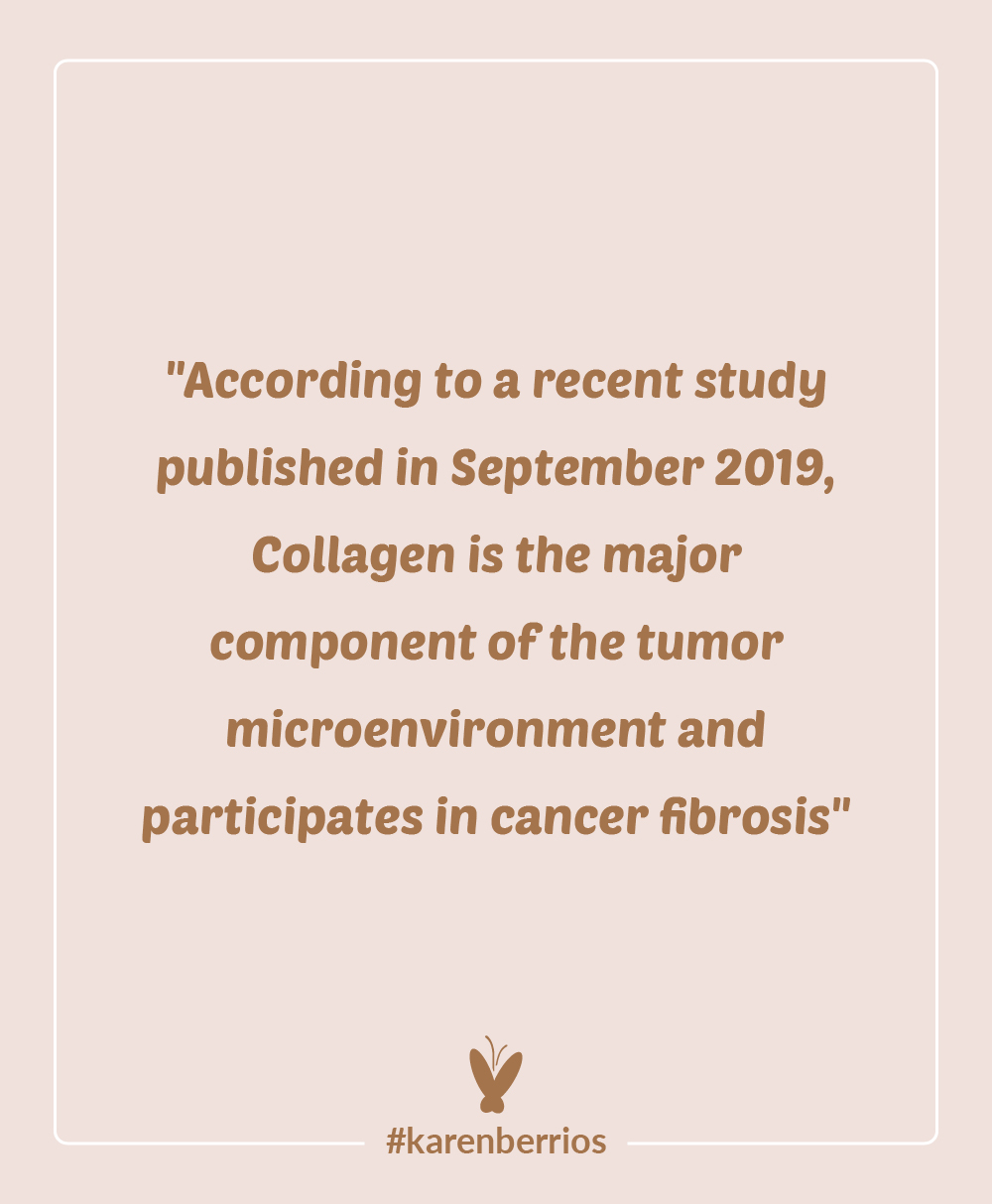

The Collagen and Cancer Connection
Collagen and Cancer. One of today’s hottest trends in the health and wellness industry is collagen. Many people, especially women are on board to add this promising supplement to their daily routine. Adding it to their coffees, smoothies and even baking with it has become the popular thing to do nowadays. Collagen, also known as the fountain of youth, for its anti-aging and therapeutic benefits has very quickly gained much attention lately especially among those in the health movement. Collagen is the major insoluble fibrous protein in the extracellular matrix and in connective tissue. In fact, it is the single most abundant protein in the animal kingdom. It provides structural support in tissues and it can affect the development and biochemical functions of cells.
The industry circulates many “Collagen Benefits” claims which include, skin health, gut health, joint pain relief, bone loss prevention, muscle growth, stimulates hair and nail growth, weight loss, etc. These claims create a buzz that many swear by while others believe it to be just another trend. There are at least 16 types of collagen, but 80 – 90 percent of the collagen in the body consists of types I, II, and III. Consuming collagen may have a variety of health benefits but is it safe for cancer patients?
According to a recent study published in September 2019, Collagen is the major component of the tumor microenvironment and participates in cancer fibrosis. Collagen biosynthesis can be regulated by cancer cells through mutated genes, transcription factors, signaling pathways and receptors; furthermore, collagen can influence tumor cell behavior through integrins, discoidin domain receptors, tyrosine kinase receptors, and some signaling pathways. In addition, another study shows, how cancer is not merely a disease of tumor cells, but a disease of imbalance, in which stromal cells and tumor microenvironment play crucial roles. Extracellular matrix (ECM) as the most abundant component in tumor microenvironment can regulate tumor cell behaviors and tissue tension homeostasis. Collagen constitutes the scaffold of tumor microenvironment and affects tumor microenvironment such that it regulates ECM remodeling by collagen degradation and re-deposition, and promotes tumor infiltration, angiogenesis, invasion, and migration. While collagen was traditionally regarded as a passive barrier to resist tumor cells, it is now evident that collagen is also actively involved in promoting tumor progression.
I must say that there is limited research available out there with regards to this topic. However, the articles I found insist on saying that collagen is a double-edged sword in tumor progression and metastasis. Perhaps an individual that has not been diagnosed with cancer may reap the benefits of taking collagen. But if you have been diagnosed with cancer like me, I would personally avoid it until further research arises. Due to a second personal diagnosis three years ago (Barrett’s Esophagus) I entertained the idea of eating collagen because it helped with my digestion and with IBS. I did it for a short while but something in me said I had to stop. I really didn’t know why but considering that ever since I started my journey I completely focused on a plant-based diet, something in me felt uneasy when taking collagen, even if it came from a high-quality source, so I stopped. I used to even promote it but again this feeling wouldn’t let me be. I strongly believe that things can not be forced and you must let things naturally flow. Collagen wasn’t naturally flowing for me. Although it is the trend and there are claimed benefits to it I just couldn’t do it any longer. For a short while, I endorsed a company that sells collagen but as I said it wasn’t for me.
Another article I found shows that high levels of CCL5 ( Cytokine) appear to shorten the amount of time between tumor treatment and recurrence because CCL5 attracts macrophages that deposit collagen in the residual tumors. Scientists believe collagen promotes tumor growth because recurrent tumors have high levels of collagen and breast cancer patients with high levels of collagen in their tumors often have worse outcomes.
An additional article titled “Cancer Reactivated by Collagen” says breast cancer cells often enter a state of dormancy in metastatic niches, and their reactivation causes the emergence of metastatic disease even many years later. The tetraspanin TM4SF1 was previously identified as a molecule that promotes metastatic outgrowth in mice injected with dormant cancer cells. Gao et al. found that TM4SF1 promotes the reactivation of dormant breast cancer cells in the lung, bone, and brain by facilitating signaling in response to cellular contact with type I collagen, a major component of the extracellular matrix (ECM). Given that the presence of type I collagen stimulates cell migration out of the primary tumor, these new findings reveal another mechanism by which this ECM component promotes metastatic disease.
I must admit I am not a doctor nor a scientist however I am very much interested in learning and sharing with others what I learn. It seems to me that the more I dig the more it appears that collagen is not a good idea for cancer patients. If you’ve been diagnosed with cancer and take collagen, I would strongly encourage you to do further research and talk to your health care provider for additional insight. As always I welcome your comments and experiences. I long to build a community where we can all learn from each other and offer support during the journey. Thank you for walking with me and blessing me with all your positive comments and encouragement.
3 Comments

hey there
I'm Karen!
I have found my cancer journey to be a positive and profound transformational experience. I’m inspired to share my healing journey here, and trust you’ll find hope, encouragement and purpose as you discover the healing power that lies within you.
Join
The Mailing List!
By signing up for my newsletter, you agree with our Privacy Policy and Terms & Conditions.




I use a plant based collagen builder,the trend to use collagen from animals is hopefully decreasing, with the growth in plant nased diets and veganism.I love this whole concept although not strictly vegan.I am more than convinced you can heal and repair from inside out with looking after your self inside and out.I wished ihad been able to help my mum more with naturopathy remedies and recipes when she had her brain tumour.I was shocked at the advice given for foods to eat for her.
I was diagnosed with breast cancer in 2017, HER2+, a tumor that had metastasized to 1 lympth node. I was successfully treated and beat it using chemo, surgery , radiation, and Perjeta & Herceptin. I’ve been using a coconut based collegian and need to know if it has the exact same results in the body with tumor involvement as the bovine sourced. I never had any peace of mind for purchasing the variety that basically came from boiling cattle bones and skin!
I too have had a cancer scare and have spent many hours researching the link between toxins and cancer. I use a clean plant based collagen elixir that gives your body what it needs to produce its own collagen. Just because you take collagen from an animal or plant does not mean your body is going to actually absorb it. I have experienced some amazing results with what I take and I’m almost 9 years cancer free!!! It definitely pays to research!!!